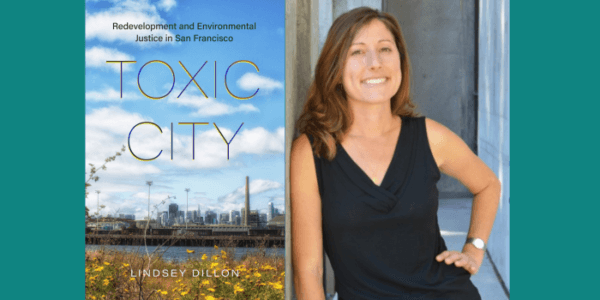Joshua Trey Barnett is an Assistant Professor of Communication Arts and Sciences at Penn State, where he holds a joint appointment at the Huck Institutes of the Life Sciences. His writing has appeared in numerous publications, including Quarterly Journal of Speech, Environmental Communication, Communication, Culture & Critique, and Ethics & the Environment, and he’s currently writing a book about the rhetorical conditions of ecological grief. In this conversation, we discuss Composing Climate Change, a special issue of UC Press’s journal Departures in Critical Qualitative Research which Professor Barnett guest edited.
UC Press: Thank you for organizing this special issue!

JTB: My pleasure. Working with the writers whose works appear in this special issue was a joy for me. There is something very satisfying about witnessing and shepherding the writing process.
UC Press: What does it mean to “compose” climate change? And what inspired you to pursue this topic in a special issue of DCQR?
JTB: Before I say anything about composition, it is useful to remember that “climate” refers both to long-term weather patterns and to cultural, political, economic, ethical, and intellectual atmospheres. Part of what is at stake in this special issue is the relation among these two kinds of climates. The wager we make is that if one changes, so does the other. In other words, the shift in earth systems that we usually call “climate change” is surely reshaping the conditions under which we dwell, make decisions, make our livings, decide what is right, and think. But we can also affect the arc and intensity of those planetary shifts by transforming the ways we think, feel, and act in the world.
Enter composition. To compose means to write, of course, but it also means to assemble, to put together, and to make. To compose is to put things into particular relations with one another – particular tones (in music), particular words (in prose or poetry), particular colors (in painting), and so forth. As you change the relations, new thoughts and feelings and beliefs and actions – in short, new lines of flight – become possible. To compose is to grapple with the actual so as to create the possible. It is about worlding.
The contributors to this special issue do their worlding with words and, to a lesser extent, images. DCQR was an ideal venue for this kind of compositional experimentation. Because the journal embraces plurality, the contributors were able to work across a wide range of genres and to really play – in the serious sense – with language, with image, with style, with form, with genre, and so forth. The result is an eclectic set of compositions, each of which opens onto different ways of being on and sharing the earth with others at this particular moment in geological time.
UC Press: In your introduction to the special issue, “Opening Moves: Composing Climate Change,” you note that we tend to think about climate change in terms of detached analyses, claims and assertions, and offer up an alternative: to “notice, perceive, attend to, contemplate, imagine, and feel climate change.” How does climate change lend itself to this kind of analysis? What can we gain by thinking about climate change through this lens?
JTB: Look, we have all read academic and popular writing about climate change. We are familiar with the typical formulas. Hit the reader with one “fact” after another. (In Being Ecological, Timothy Morton call this strategy the “information dump.”) Stun them with the severity of it all. Conjure fear. Stoke anxiety. Make sure they know who is responsible. Remind them that their kids, and their kids’ kids, will have to deal with the worst of it. Project into the future. Turn, finally and predictably, to hope. We are all too familiar with this kind of composition.
Very often, writing about climate change dwells in abstraction. It is easier to recite facts and statistics and predictions than it is to pay attention to what is happening on the ground, so to speak. The higher up you get, the easier it is to see the problems and the solutions. But, at ground level, things are messy. And it is certainly more efficient to rehearse well-known sky-is-falling narratives than it is to try to convey, conjure, and evoke what it feels like to be an earthling when the earthly is coming apart. What is it like to endure this prolonged period of planetary transformation?
Whether “climate change” lends itself to this kind of on-the-ground, embodied analysis, I am not so sure. In fact, in many ways it probably resists this sort of analysis precisely because, at least as we have conceptualized it, it is diffuse, pervasive, encompassing, and therefore difficult to pinpoint. Climate change is notoriously hard to apprehend. It demands different modes of attunement, different ways of paying attention, and different styles and forms of composition.
In my introductory essay, for instance, I write about witnessing the slow-motion destruction of the eastern hemlock trees outside my home office. The bug that is threatening the species was accidentally brought to the United States from Asia in the mid-twentieth century as a symptom of the global botanical trade. Its spread has been aided and abetted by warming temperatures as a result of anthropogenic climate change. All twelve of the hemlocks in our yard have succumbed to the pest. They will all be dead in a decade, probably sooner. From where I sit in my office, this whole process – which will fundamentally alter forest composition in the eastern United States and parts of Canada – barely registers. It is not very obvious; it doesn’t look like much is happening. And yet … This is what it is like to endure climate change, to witness the gradual unraveling of relations that have evolved over hundreds of thousands of years. Noticing this transformation and imagining its consequences requires disciplined attention, a kind of habitual attunement that I attempt to describe and prompt in my diaristic entries.
Just as I attempt to conjure the ordinariness of planetary unraveling, each of the contributors to this special issue casts light on other aspects of what it feels like to dwell on earth at this particular moment. And in doing so, each attunes us to climate change in their own way. Because climate change is itself so complex, we desperately need to experiment with the myriad modes of paying attention that this special issue delivers.
UC Press: Can you tell us about some of the contributions to the special issue?
JTB: Of course. In “In a Landscape,” MJ Thompson weaves elements of naturalistic observation, memoir, history (of the family, art, and national varieties), and social critique into a compelling tapestry that invites readers to dwell on the connections between capitalism, dispossession, and our disparate capacities for grappling with ongoing climate change. Grounded in her time on Cape Cod, Thompson powerfully illuminates the ways in which the loss of particular “views” – particular ways of inhabiting and seeing the earth – profoundly influences how we come to terms with life on our broken planet. In “The Sympoeisis of Clouds,” Christopher C. Collins oscillates among personal narrative, shape poetry, and performative writing. The result is a poignant, provocative meditation on interrelationality and the ways that humans are both made by and make our environments. Scaling across time and space, in “Scaling the Necropolitical Anthropocene” Tyler S. Rife performatively toggles among the human and the inhuman, the earthly and the cosmological, the intimate and the planetary. Writing from and about sunny Phoenix, AZ, Rife reveals how climate change—especially our relationship with the sun—is composed in ways that render some lives more precarious than others. I will stop there because, well, I cannot do justice to the complexity and beauty of these contributions in a few sentences. Each one is compelling in its own way; readers can expect to be transformed intellectually, affectively, ethically, and perhaps politically as they make their way through this special issue.
UC Press: Thank you for your insights in Composing Climate Change!
Departures in Critical Qualitative Research publishes innovative, experimental, aesthetic, and provocative works on the theories, practices, and possibilities of critical qualitative research. Departures is a forum for scholars in diverse disciplines to converse on, contest, and creatively reimagine the form, purpose, and mission of their work. The journal seeks works charting scholarly and theoretical developments in critical qualitative research, exemplars of methodological innovation, and inventive demonstrations of research as an aesthetic intervention and mode of critique.
online.ucpress.edu/dcqr
Twitter: @DcqrJournal



